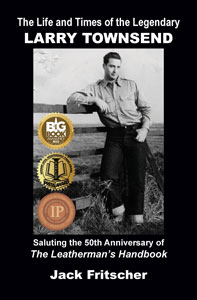NON-FICTION BOOK
by Jack Fritscher
How to Quote from this Material
Copyright Jack Fritscher, Ph.D. & Mark Hemry - ALL RIGHTS RESERVED

The Life and Times of the Legandary Larry Townsend
2
AN ORIGIN STORY
LIFE AS A MOVIE
THE ASTROLOGER’S WARNING
Larry Townsend, the charismatic author of the classic 1972 Leatherman’s Handbook, died at 2:40 Tuesday afternoon, July 29, 2008, at Cedars-Sinai Hospital in Los Angeles. Born Scorpio with Aries rising on October 27, 1930, in Jackson Heights, Long Island, he was 77 and HIV-negative when he was overcome by complications from pneumonia. Defining an era and a literary genre, he was one of the gay pioneers who changed the post-Stonewall fin de siècle of the twentieth-century. He was an urgent author in whose work fans saw the evolution of themselves in a performative S&M lifestyle. For over forty years, after meeting on February 13, 1963, he lived with his lover-partner, Fred Yerkes (August 27, 1935 – July 7, 2006), in the Hollywood Hills above the Sunset Strip and below the iconic white Hollywood Sign, the symbol of Los Angeles ambition, sex, politics, backstabbing, and dreams.
Two months after his birth, his mother in their five-room home on the top floor of 35-63 80th Street, Apt. 6A, Jackson Heights, New York, where he was conceived, paid for an astrology-like “Old Gold Broadcast Character Reading” that was answered with a three-hundred-word profile predicting her newborn son’s destiny.
December 18, 1930...After studying your name... you’re a lucky boy! Men in your group frequently become financial and scientific leaders. I do hope you won’t neglect your splendid abilities. You have good judgement, a fine mind, wisdom beyond your years, tolerance toward the views of others...but I urge you not to get in the habit of tyrannizing over your friends....You like to see people and money working for you....Your name and destiny combination...should not be changed....Petty trifles annoy you...Your type...often marry after 25....Do not change your name. Sincerely, Lorna Fantin
But change his name he did. And his destiny. He was a person of his own creation. He was a force of nature and of will. Introducing his identity and image to readers during the dawning of the Age of Aquarius, he wrote in 1970 that he was a very sexual “Scorpio with Aries ascendant.” At that time in gay popular culture, the number one pick-up line in a bar was “What’s your sign?” Writing for forty years under his primary pseudonym “Larry Townsend,” Irvin Townsend “Bud” Bernhard, Junior, authored dozens of novels including Run, Little Leather Boy (1968), The Faustus Contract (1969), The Fairy King (1970), Beware the God Who Smiles (1971), and the gay heritage guide The Leatherman’s Handbook at such erotic presses as Greenleaf Classics and the Other Traveller imprint of criminal literary thief Maurice Girodias’s Olympia Press.
Larry dedicated his Handbook to, among others, Canadian writer Ian Young who had started his own gay publishing company in 1970 and authored The Male Homosexual in Literature. Young made a pop-culture point when he wrote that these early publishers were churning out sexually explicit pulp fiction in cheap paperbacks with deliciously lurid titles and succulent covers that in lieu of reviews in a then non-existent gay press sold the books—and have since become collectible gay pop art.
Larry’s Run, Little Leather Boy with scenes in castle dungeons in Southern Germany was a famous bestseller—and a private catch phrase. When the thin-skinned Larry would get royally pissed off over some person, some issue, or some slight, and would sometimes threaten thunderbolts, we’d sometimes dare tease him back to good humor—and to get him to tone it down—by stage-whispering at him, “Run! Little Leather Boy! Run!” which, of course, made him so mad he couldn’t help but laugh at how (during his whole life) he let his emotions in his private life be buoyed up or stressed by public responses to his politics, his writing, and his prized reputation as a dashing author in our gay Vanity Fair.
The Advocate, a tad wary of the sex in Run, reported on June 23, 1971:
Despite its very clear exposition and vivid descriptive passages, the sensitive undertones of this story reflect Mr. Townsend’s background as a graduate psychologist and student of human behavior. It also suggests an intimate knowledge of a subject [S&M] in which he is already an acknowledged authority.